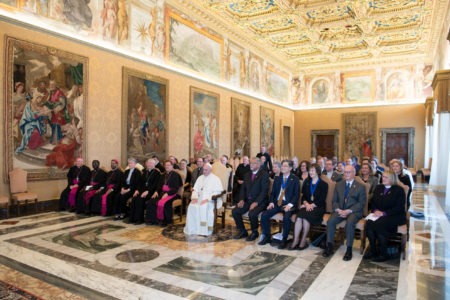Devotional ~ A New Season
 Have you sensed God stirring up something new in your heart? Are you alert and watchful for what God is orchestrating in this new season? Are you able to place the past year where it belongs – in the past – and look with rash hope for the new things God is making in your midst?
Have you sensed God stirring up something new in your heart? Are you alert and watchful for what God is orchestrating in this new season? Are you able to place the past year where it belongs – in the past – and look with rash hope for the new things God is making in your midst?
Let’s take a few moments to check in on each other as we wait for the Holy Spirit to show us the next steps to take into this new season.
As you sift through your local activities and the global news, as you invest in ministry and note current events, what is the Holy Spirit stirring up in your heart during this season? How will you join the heart of God as God nudges your attention: “See, I am making all things new . . .”?
What the Taj Mahal Taught Me About Love
 The Taj Mahal is awe-inspiring. And of course, as is so often the case when I visit a new place, I learned something unexpected and meaningful in my experience there.
The Taj Mahal is awe-inspiring. And of course, as is so often the case when I visit a new place, I learned something unexpected and meaningful in my experience there.
Read More

Save the Date!
Surrounded by the rich history of the Wesleyan movement in Northeast England, as well as some of the most well-known Wesleyan historical sites throughout the rest of England, World Methodist Evangelism and St. John’s College, Durham University will bring together leading scholars for conversations about some of the most important topics of Evangelism today.
In this rich environment, we will examine the practice of evangelism in a context where many people seem distant from the church but still wrestle with the deep questions of meaning and purpose that are found in the Gospel.
Learn More
Georgia, England, Costa Rica: World Methodist Evangelism Gatherings
 World Methodist Evangelism has been hard at work preparing to meet you on the road during 2018. Our events in the upcoming year promise to be times of connection, equipping, and transformation. Take a look at our upcoming gatherings and see if there’s one for you.
World Methodist Evangelism has been hard at work preparing to meet you on the road during 2018. Our events in the upcoming year promise to be times of connection, equipping, and transformation. Take a look at our upcoming gatherings and see if there’s one for you.
World Methodist Peace Award
 Learn more about the World Methodist Peace Award nomination process and recent recipients here:
Learn more about the World Methodist Peace Award nomination process and recent recipients here:
In Case you Missed it: Featured Posts from Wesleyan Accent
 Elizabeth Glass Turner ~ Resolutions: The Problem of Shibboleth in 2018
Elizabeth Glass Turner ~ Resolutions: The Problem of Shibboleth in 2018
It is the time of year when resolutions abound. Or if not resolutions, goals. Maybe goals are too weighty a burden: maybe wishes.[/vc_column_text][/vc_column][/vc_row]
 Damien Spikereit is a preacher whose father died two days before his high school graduation. He didn’t have very strong faith at that point, so he was struggling to hear God speak in his time of need. He wanted to know what God had to say about his situation and how he was going to get through this difficult time. So he started praying and waiting for God to speak.
Damien Spikereit is a preacher whose father died two days before his high school graduation. He didn’t have very strong faith at that point, so he was struggling to hear God speak in his time of need. He wanted to know what God had to say about his situation and how he was going to get through this difficult time. So he started praying and waiting for God to speak.
 Graham Singh
Graham Singh Luther Oconor
Luther Oconor Kelcy Steele
Kelcy Steele
 WME will be collaborating with our Institute to provide leadership for a regional evangelism seminar in Dehli, India, January 8-12, 2018. Please be in prayer for leadership in both the US and India as we continue to prepare for this important teaching event.
WME will be collaborating with our Institute to provide leadership for a regional evangelism seminar in Dehli, India, January 8-12, 2018. Please be in prayer for leadership in both the US and India as we continue to prepare for this important teaching event.
 One of our featured speakers is Dr. Joy J. Moore. Dr. Moore is Associate Professor of Homiletics and Christian Ministry at Wesley Seminary in Marion, Indiana. She is an ordained Elder in the United Methodist Church. Dr. Moore served as the founding Associate Dean of the William E. Pannell Center for African American Church Studies at Fuller Theological Seminary, where she also taught preaching. Dr. Moore was Associate Dean for Black Church Studies and Church Relations at Duke University prior to that.
One of our featured speakers is Dr. Joy J. Moore. Dr. Moore is Associate Professor of Homiletics and Christian Ministry at Wesley Seminary in Marion, Indiana. She is an ordained Elder in the United Methodist Church. Dr. Moore served as the founding Associate Dean of the William E. Pannell Center for African American Church Studies at Fuller Theological Seminary, where she also taught preaching. Dr. Moore was Associate Dean for Black Church Studies and Church Relations at Duke University prior to that. Mary’s story isn’t important simply because she gave birth to the baby Jesus (even though that is a very big deal).
Mary’s story isn’t important simply because she gave birth to the baby Jesus (even though that is a very big deal).
 The Beatitudes are helpful because they highlight the contrast between God’s kingdom and the kingdom of our world. This contrast is crucial for our understanding because following Jesus places us in sharp contrast with the world around us. The first thing to notice about the Beatitudes is that Jesus didn’t actually say them the way we are used to hearing them. In the Greek in which Jesus’ words were written, the verb “are” is not present in the Beatitudes; that word was used to render his words into English.
The Beatitudes are helpful because they highlight the contrast between God’s kingdom and the kingdom of our world. This contrast is crucial for our understanding because following Jesus places us in sharp contrast with the world around us. The first thing to notice about the Beatitudes is that Jesus didn’t actually say them the way we are used to hearing them. In the Greek in which Jesus’ words were written, the verb “are” is not present in the Beatitudes; that word was used to render his words into English.








